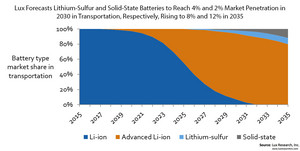BOSTON, MA--(Marketwired - Dec 1, 2015) - Lithium-ion (Li-ion) batteries have led to revolutions in consumer electronics, electric vehicles, and grid storage, but still face limitations in cost and performance. While incremental improvements will extend their dominance into the next decade, a new generation of battery technologies are rising and will be worth $10 billion by 2030, according to Lux Research.
"Next-generation battery developers are pursuing technology improvements and mass-production scale-up, though incumbent Li-ion is still improving quickly, thanks to massive investments," said Cosmin Laslau, Lux Research Senior Analyst and lead author of the report titled, "The Next-Generation Battery Roadmap: Quantifying How Solid-State, Lithium-Sulfur, and Other Batteries Will Emerge After 2020."
"Companies with an important stake in the battery market should invest in next-generation batteries as well as advances in Li-ion, to make sure they maintain a strong position as the technology mix shifts," he added.
Lux Research analysts created an adoption roadmap for next-generation batteries, quantifying the market for each technology, and ranking emerging battery developers on the proprietary Lux Innovation Grid. Among their findings:
- Transportation market is hotbed for new battery tech. Next-generation batteries will see explosive growth after 2030: Lithium-sulfur will jump from $6 billion in 2030 to $29 billion in 2035, while solid-state batteries will climb from $3 billion to $42 billion over the same period.
- Solid-state will win in electronics. Solid-state batteries will earn $12 billion from electronics in 2035, enjoying a 39% market share. Lithium-sulfur, meanwhile, will see no significant adoption in electronics, due to energy density issues, ceding ground to advanced Li-ion.
- Lux Innovation Grid calls out leaders. Imprint Energy, which makes thin-film batteries for electronics, and rapid materials developer Ilika are the Dominant solid-state companies on the Lux Innovation Grid. The lithium-sulfur landscape is sparser, with Oxis Energy and Boulder Ionics earning positive takes from Lux.
The report, titled "The Next-Generation Battery Roadmap: Quantifying How Solid-State, Lithium-Sulfur, and Other Batteries Will Emerge After 2020," is part of the Lux Research Energy Storage Intelligence service.
About Lux Research
Lux Research provides strategic advice and ongoing intelligence for emerging technologies. Leaders in business, finance and government rely on us to help them make informed strategic decisions. Through our unique research approach focused on primary research and our extensive global network, we deliver insight, connections and competitive advantage to our clients. Visit www.luxresearchinc.com for more information.
Contact Information:
Contact:
Carole Jacques
Lux Research, Inc.
617-502-5314
carole.jacques@luxresearchinc.com
